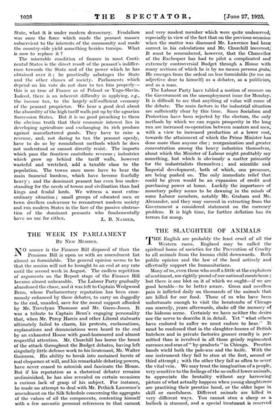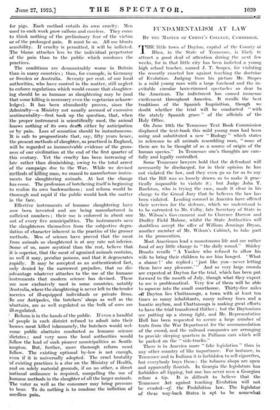THE SLAUGHTER OF ANIMALS
THE English are probably the least cruel of all tI4 Western races. England may be called the spiritual home of societies for the Prevention of Cruelty to all animals from the human child downwards. Both public opinion and the law of the land actively and effectually support the humanitarians. Many of us, even those who scoff a little at the exploiters1 of sentiment, are rightly proud of our national escutcheon but there is one blot on it of which we ought—if we are good heralds—to be better aware. Gross and needless pain is inflicted daily on thousands of the animals that are killed for our food. Those of us who have been unfortunate enough to visit the hecatombs of Chicago, can scarcely, years afterwards, shake off the memory of the hideous scene. Certainly we have neither the desire nor the nerve to describe it in detail. Yet " what others have endured to suffer we must endure to hear." It must be confessed that in the slaughter-houses of British butchers and in private factories grosser cruelty is per- mitted than is involved in all those grimly regimented' carcases and seas of " by-products " in Chicago. Prentice hands wield both the pole-axe and the knife. With the one instrument they fail to stun at the first, second or third attempt ; with the other they fail as often to sever, the vital vein. We may trust the imagination of a people,, very sensitive to the feelings of the so-called lower animals,, to appreciate the brutality without any harrowing: picture of what actually happens when young slaughterers) are practising their prentice hand, or the older lapse is skill or carefulness. Different animals are killed in very different ways. You cannot stun a sheep as a bullock is stunned, and a special treatment is reserved) for pigs. Each method entails its own cruelty. Men used to such work grow callous and careless. They come to think nothing of the preliminary fear of the victim or of the prolonged pain. It must be so. All use blunts sensibility. If cruelty is permitted, it will be inflicted. The blame attaches less to the individual perpetrator of the pain than to the public which condones the practices.
The conditions are demonstrably worse in Britain than in many countries ; than, for example, in Germany or Sweden or Australia. Seventy per cent. of our local authorities, who have control in the matter, still neglect to enforce regulations which would ensure that slaughter- ing should be as humane as slaughtering may be (and That some killing is necessary even the vegetarian acknow- ledges). It has been abundantly proven, since the Admiralty—a Ministry not usually accused of excessive 'sentimentality—first took up the question, that, when the proper instrument is scientifically used, the animal knows nothing of its own death either by anticipation or by pain. Loss of sensation should be instantaneous. It is safe to prognosticate that, say, fifty years hence, the present methods of slaughter, as practised in England, will be regarded as inconceivable evidence of the gross- ness of our civilization at the end of the first quarter of this century. Yet the cruelty has been increasing of late rather than diminishing, owing to the total arrest of the campaign due to the War. While we devised 1 imethods of killing man, we ceased to manufacture instru- ments for slaughtering animals. At last the change has come. The profession of butchering itself is beginning to realize its own backwardness ; and reform would be thorough and rapid if the public would look the matter in the face.
Effective instruments of humane slaughtering have now been invented and are being manufactured in sufficient numbers ; their use is enforced in about one out of every five municipalities. The instruments save The slaughterers themselves from the subjective degra- dation of character inherent in the practice of the grosser methods. Men of science have proved that the meat from animals so slaughtered is at any rate not inferior. Some of us, more mystical than the rest, believe that it is superior, that the meat of agonized animals contains, As well it may, peculiar poisons, and that it degenerates !rapidly. It may be accepted as an authenticated fact, only denied by the narrowest prejudice, that no dis-- Advantage whatever attaches to the use of the humane 'instruments that modern science has devised. These 'are now exclusively used in some countries, notably (Australia, where the slaughtering is never left to the tender mercies of ill-equipped individuals or private firms. 'In our Antipodes, the butchers' shops as well as the abattoirs, are as well regulated as the bulk of ours arc ill-regulated. I ' Reform is in the hands of the public. If even a handful 1of people in each district refused to admit into their (houses meat killed inhumanely, the butchers would wel- come public abattoirs conducted as humane science idietates ; and very soon the local authorities would follow the lead of such pioneer municipalities as South- lampton. But; further, more thorough reform must follow. The existing optional by-law is not enough, even if it is universally adopted. The cruel brutality of existing practices is a slur on the Ministry of Health, hnd on solely material grounds, if on no other, a direct {national ordinance is required, compelling the use of ??humane methods in the slaughter of all the larger animals. The voter as well as the consumer may bring pressure to bear. To do nothing is to condone the infliction of needless pain.











































 Previous page
Previous page